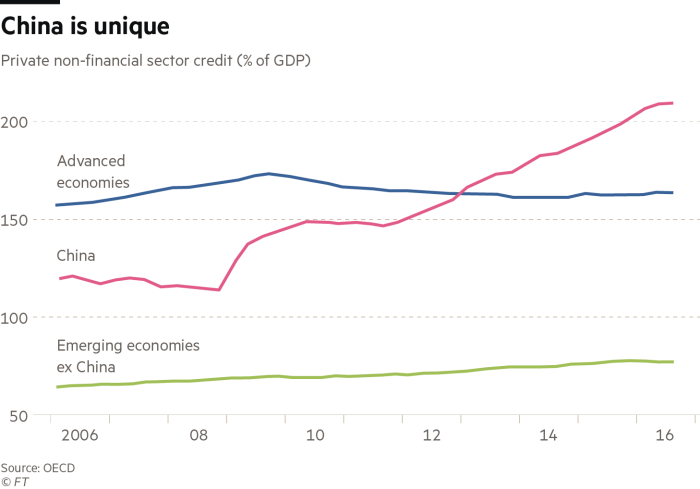Die uneinsichtigen Starrköpfe der BIZ?
In der letzten Woche habe ich erneut – wie schon in den Vorjahren – die Bank für Internationalen Zahlungsausgleich an dieser Stelle als Kronzeugen für gute Wirtschaftspolitik angeführt. Nicht alle sehen die BIZ so positiv. Martin Wolf von der FINANCIAL TIMES (FT) – ein wirklich kluger Kopf, den ich ein paar Mal live erleben durfte –, hat erneut kritisch auf die Empfehlungen geblickt. Hier seine Sicht aus der FT von der letzten Woche. Ergänzend bringe ich heute Nachmittag seine Sicht aus dem Jahr 2014 und meine damalige Kritik. Zumindest ist er konsistent.
- “The Bank for International Settlements (…) has argued for monetary and fiscal tightening, whether that makes sense, or not. Fortunately, policymakers (…) have ignored its apparent conviction that the world needed an even deeper and more prolonged recession.” – bto: Ich denke, hier hinkt er. Natürlich wäre es mehr als dämlich, eine erneute große Depression zuzulassen. Aber daraus zu schließen, dass die heutige Politik a) die einzige Möglichkeit ist bzw. b) wirklich dazu geeignet sei, die Probleme zu lösen, halte ich für mindestens ebenso falsch.
- “It is worth recalling how wrong the BIS has been in the past. In June 2010, when, as we now know, the post-crisis damage was very much with us, the BIS already asserted that ‚the time has come to ask when and how these powerful measures can be phased out‘. Oh no, it had not. The time had come to act more aggressively to accelerate the recovery and so limit the longer-term damage of the crisis.” – bto: Das mag sein, aber ich bleibe dabei, dass es eben keine Lösung ist, sondern das Kaufen von Zeit.
- “(…) the OECD (…) expects a modest pick-up in global growth this year and next. (…) So what risks lie in wait for the recovery? An obvious one is that monetary tightening will be too fast, even in the US, let alone the eurozone. Inflationary pressure remains remarkably subdued. Even the BIS, a worrywart’s worrywart, agrees that resurgence of inflation is not a large risk.” – bto: Wir sind eben in einer deflationären Welt, wobei die Notenbanken mit den tiefen Zinsen die Zombies am Leben halten, die dann wiederum die deflationären Tendenzen verschärfen.
- “(…) globally, debt is at record levels: in 2016, the stock of non-financial sector debt in the economies [of the group of 20 countries] stood at around 220 per cent of GDP, almost 40 percentage points higher than in 2007. A striking feature is the remarkably rapid growth of credit and debt in China.” – bto: wobei die Abbildung wirklich interessant ist. Es zeigt sich, dass der Anstieg der Schulden wirklich nur aus China kommt, während die Privatschulden im Westen leicht rückläufig waren:
Quelle: FINANCIAL TIMES
- “As interest rates rise, financial risks will crystallise. Yet reasons for optimism on this point also exist: the core western financial system is far better regulated and capitalised than it was in 2007; the Chinese authorities can stabilise their financial system, if necessary; no globally significant credit-driven boom is to be seen, except in China; and, finally, even though prices of highly valued equities might fall, that would not of itself cause a crisis in the credit system.” – bto: Damit wäre er mit Janet Yellen einer Meinung. Das spricht für sie.
- “(…) another danger is renewed weakness in aggregate demand. (…) But, so long as inflation remains subdued, both monetary and fiscal room for manoeuvre remains. Of course, this also argues against premature monetary tightening.” – bto: Und hier springt er nach meinem Geschmack zu kurz. Warum haben wir denn eine schwache Gesamtnachfrage? Weil wir zu viele Schulden haben, weil die alternde Gesellschaft mehr spart, weil die Produktivitätszuwächse so enttäuschen? Eine Fülle an Faktoren, die es nicht leicht machen, mit den Schulden umzugehen.
- “The (…) greatest danger is a collapse in global co-operation, perhaps even an outbreak of conflict. (…) rising inequality, a concentration of job losses at the middle-skill level and sharp declines in jobs in manufacturing in the high-income economies (…) led to the protectionism we see, notably in the US.” – bto: Dazu packt er ein Chart, welches wirklich sehr interessant ist:
Quelle: FINANCIAL TIMES
- “(…) as economies recover, we face new challenges: to avoid blowing up the world economy, while ensuring widely shared and sustainable growth. Alas, we seem likely to fail this set of challenges. The BIS talks, sensibly, of building resilience. A part of this lies in ensuring that growth becomes less dependent on debt. (…) If we fail to respond to these structural challenges, the recovery is unlikely to prove strong or lasting.” – bto: Es ist unstrittig, dass wir diese Themen angehen müssen. Wie die Welt weniger von Schulden abhängig wird, ist schwer vorstellbar. Vielleicht hilft dabei in der Tat mehr Umverteilung, wobei ich daran erinnere, dass es nun in Deutschland wahrlich nicht so ein großes Problem ist, wie immer in der Diskussion dargestellt. Wenn überhaupt muss man der Mittelschicht endlich mehr Geld lassen.
→ FT (Anmeldung erforderlich): “Risks remain amid the global recovery”, 4. Juli 2017









